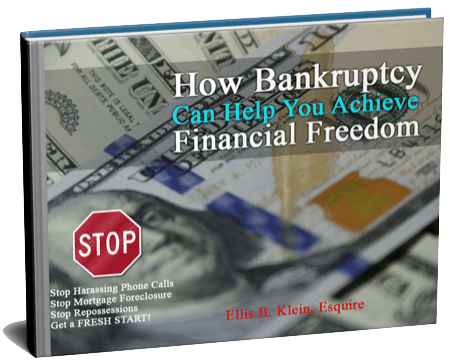District Attorney
Chapter 7 Bankruptcy
What is Chapter 7 Bankruptcy?
Chapter 7 Bankruptcy, also known as a “Liquidation” or “Fresh Start” bankruptcy will discharge (wipe out) all of your unsecured debt. If your debt is out of control and you are unable to pay your creditors back, filing for Chapter 7 Bankruptcy will wipe out your debt, give you a fresh financial start, and will eventually allow you to reestablish your credit.
As soon as you file for Chapter 7 bankruptcy with the court, you are under the protection of the Automatic Stay which means that by law, your creditors must suspend all types of collection activity. This includes calling you at home or work to try to collect a debt, calling your relatives, filing a lawsuit against you, sending you threatening letters, selling your home or personal property in a sheriff sale, utility shutoffs, and other collection activity. Once a creditor receives notice from the bankruptcy court that you filed for bankruptcy, if they contact you about your debt, they can be sued in Bankruptcy Court for violating the Automatic Stay of Proceedings. Creditors are aware of the Automatic Stay and as soon as you file the bankruptcy and they get notice from the Bankruptcy Court, the phone calls and collection activity will stop. Once you complete the bankruptcy and the debt is discharged, you no longer owe that money to your creditors. The debt is simply wiped out by court order and you can start fresh. Many times, once you retain a lawyer to file bankruptcy for you, many creditors will stop calling you knowing that they will not be able to collect on the debt.
What Types of Debt can be Discharged in a Chapter 7 Bankruptcy?
- Credit card bills
- Medical/hospital bills
- Delinquent utility bills
- Unsecured loans (signature loans or payday loans)
- Deficiencies from past repossessions
- Deficiencies from past foreclosures
What is the Process for a Chapter 7 Bankruptcy?
Chapter 7 bankruptcy is a relatively quick process and takes roughly 6 months from start to finish. In order to be eligible for Chapter 7, you must demonstrate to the court that you have no monthly income left after paying back your normal cost of living expenses and that you do not own property in excess of what is permitted by the Bankruptcy rules. You must also pass what is called a “Means Test” showing that you make less than the maximum amount of money allowed for this type of bankruptcy. In almost every case you will be allowed to keep all of your property. I have represented thousands of clients over the last 20+ years in practice who were NOT required to surrender any property to the court for sale.
Once the chapter 7 bankruptcy is filed, all of your creditors get mailed notice of the Chapter 7 Bankruptcy filing. Once your creditors receive this notice, you are under protection of the Automatic Stay of Proceedings and it is against the law for them to contact you. At this point, your phone will stop ringing and you will stop receiving bills and threatening letters in the mail.
A short time later, you and your creditors will be mailed notice of the “Creditor’s Meeting.” This is a formal court hearing where the Bankruptcy trustee, who is a lawyer appointed by the bankruptcy court to oversee the case, will swear you in and ask you questions under oath. In most cases these questions are routine and the trustee will examine your monthly income and monthly expenses to determine that you are insolvent (no money left over to pay your creditors). We will be sitting right next to you at this meeting and you will be well prepared and will know exactly what the trustee will ask you. Your creditors are also allowed to attend this hearing and ask you questions, but generally speaking, creditors do not appear because they know your debt will be wiped out by the court. If the creditor does appear at this hearing, it is usually to determine whether or not there has been fraud involved such as running up your credit cards right before filing for Chapter 7 bankruptcy, for example.
Once the trustee concludes his examination, they will typically tell you that they will recommend discharge and forward a report to the court. You will then receive the discharge in the mail which is the official court document that wipes out your debt. Once your debt is wiped out you can then go about establishing credit once again and not falling into the same credit trap.
Will I Lose My House or My Car in a Chapter 7 Bankruptcy?
If you file for Chapter 7 bankruptcy and you are current on your home mortgage or current on your car loan you can choose to reaffirm the debt and retain the property. A reaffirmation agreement means that you agree that you still owe the debt and will continue to make the monthly payments on your mortgage and/or car loan. Once you reaffirm this debt, you agree that you are personally liable for the debt and cannot at a later time decide not to pay it without risk of losing the property. So long as you make your mortgage and/or car payments, you will be allowed to keep the property. A Reaffirmation agreement will be reviewed by a bankruptcy judge to determine if the agreement is in your best interest.
You can also choose to surrender the property and not be responsible for the debt associated with it. You can also choose to surrender your home or automobile in what is known as a “voluntary surrender”. The property will eventually be sold at sheriff sale or auction and if the sale price is less that what it owed on the property, you cannot be forced to repay the deficiency if your bankruptcy is discharged.
For example, If you owe $100,000 on your mortgage and your house sells at sheriff sale for $50,000, unless you file for Bankruptcy then you still owe the mortgage company the $50,000 deficiency. Chapter 7 Bankruptcy will wipe out your obligation to pay any potential deficiency on your home or your car loan.
The experienced attorneys at Ellis B. Klein & Associates have been assisting clients to get financially back on their feet for over 20 years. We have represented thousands of clients in bankruptcy court and have helped to wipe out millions of dollars of consumer debt. If you are being harassed by your creditors, please give us a call for a free consultation and we will be happy to discuss how we can help you to stop the harassment, get a fresh start and reestablish your credit.

Stop Harassing Phone Calls
Stop Mortgage Foreclosure
Stop Repossessions
Stop Utility Shutoffs
Ellis B. Klein & Associates
Helping people achieve financial freedom since 1999.
Put our experience to work for you.
Call or email us for a FREE CONSULTATION










